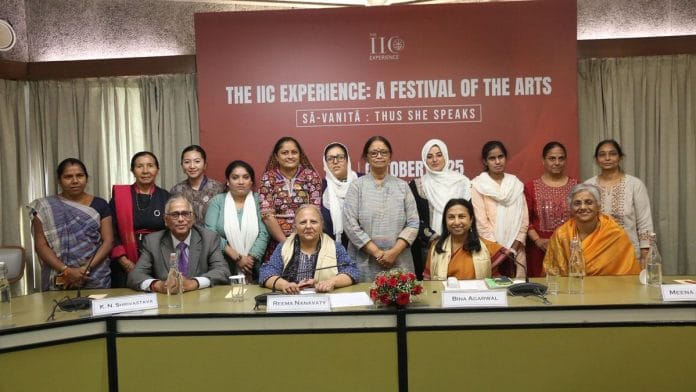New Delhi: In her twenties, Sabrina Nazreen manages her father’s medicines and pays for her younger siblings’ education, no small feat in J&K’s Kupwara, where few girls are allowed to study or work. She had to leave school in Class VI, but her fortunes changed when SEWA, a trade union for women in the informal economy, reached her district and offered a chance to learn and earn at the same time. Nazreen chose embroidery.
“When I used to go to the SEWA centre to work, people would pass comments — asking where I was going and warning that something bad would happen,” she said. “But as they saw me grow, other women started joining me too. My father had given up on my education, but today I’m a graduate.”
Nazreen was speaking at an event on 13 October to celebrate the role of SEWA, short for the Self-Employed Women’s Association, in improving the lives of informal women workers. The discussion was part of the Festival of the Arts at the India International Centre, themed ‘Sā Vanitā: Thus She Speaks‘, where SEWA also put up stalls selling items such as cloth-bound diaries, stoles, and snacks.
The audience included professors, diplomats, activists, and visiting scholars. They had gathered to learn more about the organisation that began on the streets of Ahmedabad more than five decades ago.
Dr Bina Agarwal, SEWA chairperson and professor of development economics at the University of Manchester, opened the conversation.
“SEWA is the single most important women’s organisation in the country,” she said. “It organised a sector that people thought was unorganised, and unionised workers no one imagined could be unionised.”
Unlike traditional trade unions for formal workers, SEWA represents the ‘invisible’ workforce of women who sell vegetables, make bidis, sew clothes, or work in households. Founded by the late activist Ela Bhatt in 1972, the union began with ragpickers, vendors, and bidi workers, and now has over 30 lakh members across India, with branches in other parts of South Asia and Africa. It also runs a cooperative bank.
“It brought to women workers what we normally associate with the formal sector — social protection, secure livelihoods, health insurance, financial inclusion, and most importantly, social identity,” Agarwal added.
Also Read: Daastan-e-Guru Dutt starts with songs, claps, wah-wahs. Ends with ‘aise bhi jaata nahin koi’
‘Banyan rather than eucalyptus’
Agarwal compared SEWA to a banyan tree, a metaphor that drew murmurs of appreciation from the audience.
“Over 52 years, SEWA’s strategy of bringing women into unions and collectives has grown like a large banyan tree — nurturing, spreading, and strengthening. Unlike the eucalyptus, which sucks up all the water, the banyan nurtures everything beneath it,” she said.
That banyan imagery was carried forward by Reema Nanavaty, who has led SEWA for over three decades.
“Our members are the common thread that keeps the banyan tree together,” she said. “Our organisations are the beads. The form may vary, but the values stay the same.”
Dressed in a simple kurta, Nanavaty recounted SEWA’s early struggles. When the women first proposed starting their own bank in 1974, officials laughed.
“The registrar told us it would be suicidal — that illiterate women can’t run a bank. It took us two years to register it, and today we have over 2.5 lakh shareholders, all women,” she said.
That same collective strength has guided SEWA’s growth beyond India.
“The issues of informal women workers are the same, whether in India, Afghanistan, Nepal, or Sri Lanka,” Nanavaty said. “That’s why SEWA has grown into a regional movement.”
Also Read: Identity and belonging were centre stage at Delhi Art Weekend exhibition by Usual Suspects
Political but not partisan
The SEWA movement has always been political in its purpose, but not partisan in its practice, according to Nanavaty.
“We believe in political action but refrain from electoral politics. Our strength lies in women presenting their issues themselves — not through political parties,” she said.
Ela Bhatt, who founded SEWA in 1972, called women’s economic independence “second freedom”. She died in 2022, but her words still guide the organisation. Nanavaty joked that the Hindi term “dusri azadi” can be wrongly interpreted in current times but she invoked Bhatt’s meaning.
“Freedom, for us, means economic as well as mental. A woman is not truly free until every household enjoys food, clean water, shelter, and dignity from their own earnings.”
More than half a century later, many SEWA members are under 35 but still taking forward Bhatt’s Gandhian vision in new contexts — digital work, climate change, and migration.
“We are not getting old, we are getting young,” Nanavaty smiled. “The union has to stay relevant to the needs and expectations of younger members.”
The evening ended with remarks by Bangladesh High Commissioner to India Hamidullah Riaz, who has worked with SEWA on regional cooperation projects.
“When I first heard of SEWA, I thought it meant ‘to serve’ — and in a way, it truly does,” he said. “Sovereignty concerns were strong, but SEWA showed that women’s economic solidarity can transcend borders.”
(Edited by Asavari Singh)






